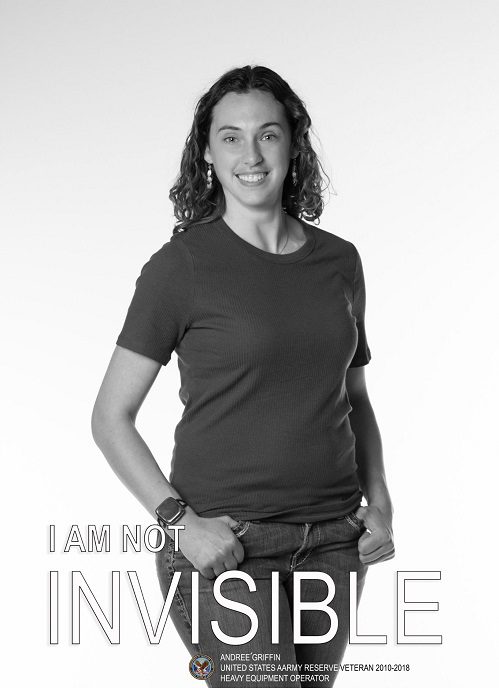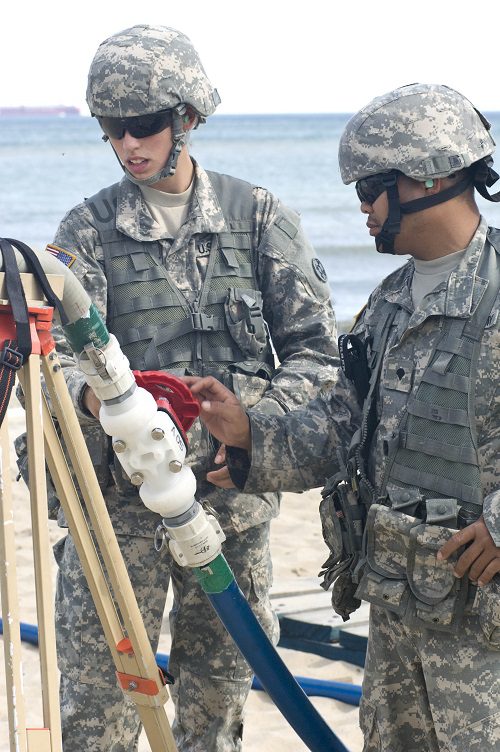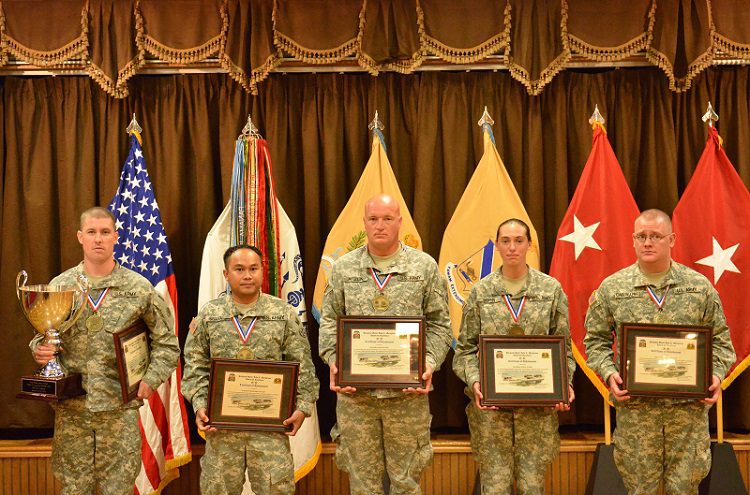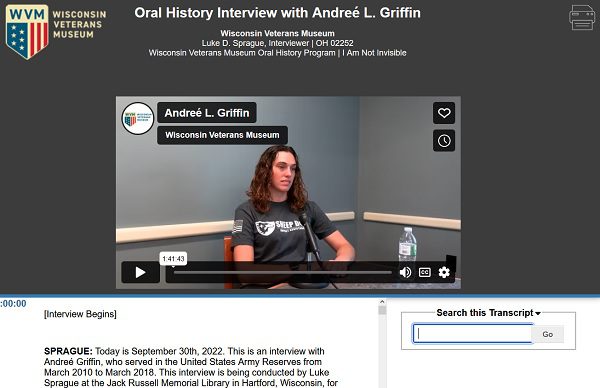
Andreé L. Griffin, part of the I Am Not Invisible Oral History Project ’22.
For Women’s History Month, we feature Andreé L. Griffin, who served in the United States Army Reserves from March 2010 to March 2018 and grew up in Slinger, Wisconsin. She describes her childhood as a "typical country" and included learning to ride and care for horses, a passion she continued into adulthood.
Griffin was still determining what she wanted to do after high school: she couldn't afford college and didn't want to accumulate debt. After speaking with a recruiter while in high school and sharing her interests in higher-level sciences and fieldwork, she planned to enlist in the army reserves and train to become a water treatment specialist. Following that, she would come home and start college using her G.I. Bill educational benefits, including the additional financial benefits of the G.I. Bill Kicker program. With her parents signing her enlistment papers, she took everyone by surprise and enlisted at seventeen.
Griffin left for basic training just after turning eighteen, and the army sent her to Fort Jackson, South Carolina. She recounts the emotions of being away from home for the first time and the uncomfortable summer heat and humidity of the South. Griffin felt proud upon her graduating from Basic Training. Next, the army sent her to AIT (Advanced Individual Training) at Fort Lee, Virginia. AIT involved lots of classroom time on the technical aspects of different water purification systems. While at AIT, she realized the job she was training for differed from what she'd thought she'd signed up for. While not a bad job, it involved less science than the Army led her to believe.

Private First Class Andreé Lynn Griffin (left) and Specialist Sam Sisavath (right), both water treatment specialists with the 753rd Quartermaster Company of Green Bay, Wisconsin, turn salt water from the Fort Story, Virginia, coast into potable water during the 2011 Reverse Osmosis Water Purification Unit Rodeo. The appearance of U.S. Department of Defense (DoD) visual information does not imply or constitute DoD endorsement. 449802. Public domain.
Griffin graduated from AIT in December 2010. She returned to Wisconsin and enrolled in Moraine Park Technical College classes. From 2011 until January 2013, she drilled monthly with the Army Reserve Unit, 753rd Quartermaster Company, based in Green Bay, Wisconsin, as a Military Occupational Specialty 92W. She also participated in the annual training of three to four weeks, which took place at Fort McCoy, Wisconsin. Griffin recalls the mentorship she received from Staff Sergeant Jason Premer.
Addressing other reservists while in civilian clothes
In 2011 and 2012, Griffin was a member of her unit's five-member ROWPU (Reverse Osmosis Water Purification Unit) team and participated in the national ROWPU Rodeo. Like the Best Warrior Competition, the Army sponsors an annual ROWPU Rodeo to challenge water purification specialists and to build confidence and camaraderie among soldiers. Teams competed to see who could correctly produce potable water from seawater the fastest. Team members must demonstrate both technical skills and knowledge. Griffin participated in ROWPU rodeos at Fort Story and Fort Lee, Virginia. In 2012, Griffin's team won the national competition. This victory was big: her part-time reserve team beat out a full-time Special Forces team.

2012 ROWPU National Champions. The 753rd Quartermaster Company, from Greenbay, Wisconsin, took home the first-place trophy in the 2012 Reverse Osmosis Water Purification Unit (ROWPU) Rodeo. Griffin is second from the right. The appearance of U.S. Department of Defense (DoD) visual information does not imply or constitute DoD endorsement. 657295. Public domain.
In 2013, as part of her plans to attend Meredith Manor Equine College in Waverly, West Virginia, Griffin transferred to 2nd Platoon, 779th Engineering Company, in Parkersburg, West Virginia. The army ordered the unit to deploy to Afghanistan. From January to August, she drove down from her residence in Virginia for monthly drill. The monthly exercises included preparing for deployment with health, financial, and legal paperwork. In July, she was reclassed and trained to use heavy equipment at Fort Hunter Liggett, Jolon, California. Overall, the unit spent eight weeks in Mississippi for mobilization, which included learning about the customs and religion of Afghanistan.
In November 2013, Griffin's unit deployed from Camp Shelby, Hattiesburg, Mississippi, to Bagram Air Base, Afghanistan, as part of Operation Enduring Freedom (OEF). While there, she was part of a heavy equipment unit and was responsible for operating heavy equipment and the maintenance records for her platoon. Much of the work involved Bagram Air Base itself. The military constructed the base hastily, and a significant project was rebuilding the ammunition supply point.
Taking cover from a mortar round behind a concrete barrier
Griffin recalls watching movies and playing pool in the MWR (Moral Welfare and Recreation) on the base when not working. She especially remembers the squad leader, Staff Sergeant Maston, who was always there for his soldiers. Very few women were in the platoon: she estimates about two per platoon. For the most part, women were treated as fellow soldiers. Near the end of her deployment, the Army promoted Griffin from E-4 to E-5.
Griffin's unit was sent home in August 2014 to demobilize in New Jersey. She was excited to see friends and family and to ride a horse again. When demobilization was complete, she transferred back to her unit in Green Bay, Wisconsin, as a water treatment specialist, drilling as an E-5.
Return home and reconnecting to the civilian world
Upon the birth of her son, she decided to go on inactive reserve status for her last two years. Her unit was looking at deployment, and she wanted to be there for her son. Griffin had mixed emotions about leaving the military. She would miss her military family. However, she has continued to be in touch with some of them, including one she describes as one of her closest friends.
Since that time, Griffin has become involved in veterans organizations. For example, she went on a dog sledding and camping trip with the Milwaukee Veterans Center to the Boundary Waters in Minnesota. She has also participated in outdoor adventures (e.g., mountain biking, fly fishing, and ATV riding) run by the Wisconsin chapter of the national veterans' organization Sheep Dog Impact Assistance.
Participating in veterans organizations
In closing, Griffin shared that her military experience shaped and determined the course of her life. Deployment in Afghanistan was difficult, but the experience of leaving home, living on the other side of the world, experiencing another culture, and gaining a second military family was worth it. She would do it all over again.
For the complete interview, click on the image below:


